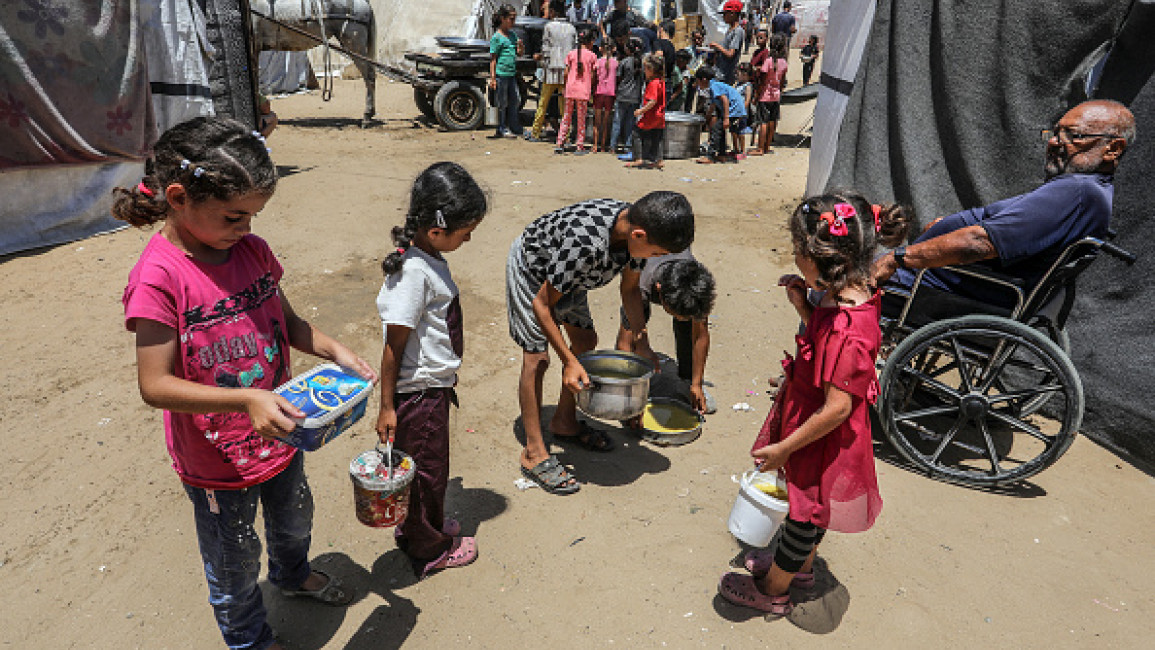Due to Israel’s war, baby milk and formula is impossible to find in Gaza
Israel's war on Gaza has led to several humanitarian disasters and immense shortage of necessities for life. Among the most impacted are infants, children, and their parents, with baby milk and formula virtually impossible to obtain.
Speaking to The New Arab, several Palestinians in Gaza described how milk and formula exclusively made for babies have become a scarce commodity in this war, forcing them to search for milk for days and sometimes weeks before obtaining it at exorbitant prices.
Rewaa Asaad, a Palestinian-displaced woman, faces great difficulties every day in obtaining formula milk for her four-month-old baby girl.
The 27-year-old mother of three, sheltering in a tent in al-Mawasi in Khan Younis city in the south of Gaza, said to TNA, "I gave birth to my baby girl two weeks early because of the terror we are living in the war [...] My giving birth was not natural."
Her baby girl needed formula since Asaad was unable to breastfeed naturally. "Throughout the months of war, I did not receive healthy food. Due to the lack of food and water, my body lost all vitamins, and I was no longer able to produce natural milk [...] I suffer from hunger and my baby also faces hunger and malnutrition," the young woman said.
Because of hunger, Asaad says her baby often cries for long periods. "I am afraid that she will suffer from additional diseases due to hunger and also due to her constant crying," the woman remarked in desperation.
In an attempt to provide milk for his baby, Ahmed Asaad, Rewaa's husband, moves between pharmacies and public markets, searching. Ultimately, he went to the black market but does not have enough funds to buy the product.
However, he did not have the money to buy it, which made him feel "helpless.".
"We have experienced all kinds of torment in this war [...] There are no elements of survival [...] We are all (us and our children) dead, but with a difference in time," the 40-year-old man told TNA.
Since October, Israel has imposed a tight blockade on the Gaza Strip, preventing the arrival of food, water, and basic human needs.
More than 90% of children in the besieged coastal enclave suffer from malnutrition and starvation due to the severe shortage of baby formula and basic food supplies, the Palestinian Ministry of Health in Gaza said.
Meanwhile, the shortage of basic materials has led to a significant increase in prices, and because few Palestinians have a regular income and aid does not reach everyone, most Palestinians in Gaza are forced to either rely on their savings or live off of charity.
This forces parents to search for inadequate and even unsafe alternatives.
Mufida Abu Shamala from the town of Beit Hanoun in the northern Gaza Strip was forced to feed her infant daughter solid foods that her small body may not be able to digest, rather than see her starve.
"I know we are doing something harmful to her, but there is nothing, she is crying all the time," the 25-year-old mother of two told TNA as she fed her crying daughter crushed biscuits in her tent.
Shaimaa Al-Amsi, another displaced Palestinian woman, was also forced to give her child milk for adults that she had received from food aid from UNRWA.
"I know that it is not good for my child, it is intended for one-year-olds and above, but we have no other option," the 39-year-old mother of five told TNA. "Infants here are not satisfied in this situation that we live in inside the tents. We want food for this baby, and nothing is suitable for her except baby milk, which is not available."
"Using unhealthy alternatives to feed children has negative consequences on their health, especially since their stomachs are unable to digest food properly, which leads to constipation and digestive problems, not to mention malnutrition in children," Emad al-Hamas, a Rafah-based Palestinian doctor, remarked to TNA.
International organisations warned that the vast majority of the population of Gaza, estimated at 2.3 million Palestinians, are living in displacement amid harsh conditions due to the Israeli war since October.
The Director-General of the World Health Organisation, Tedros Adhanom, said in a press statement that "a large proportion of the population of the Gaza Strip is facing a catastrophic level of food shortages and conditions close to famine."
Malnutrition has led to the death of 37 people, including 28 children under the age of five, and more than 8,000 children under the age of five have been diagnosed with severe malnutrition and treated for it, including 1,600 children suffering from chronic malnutrition.
Due to the lack of security, Adhanom explained that only two centres can operate in the Strip to treat or stabilise patients suffering from severe malnutrition.



